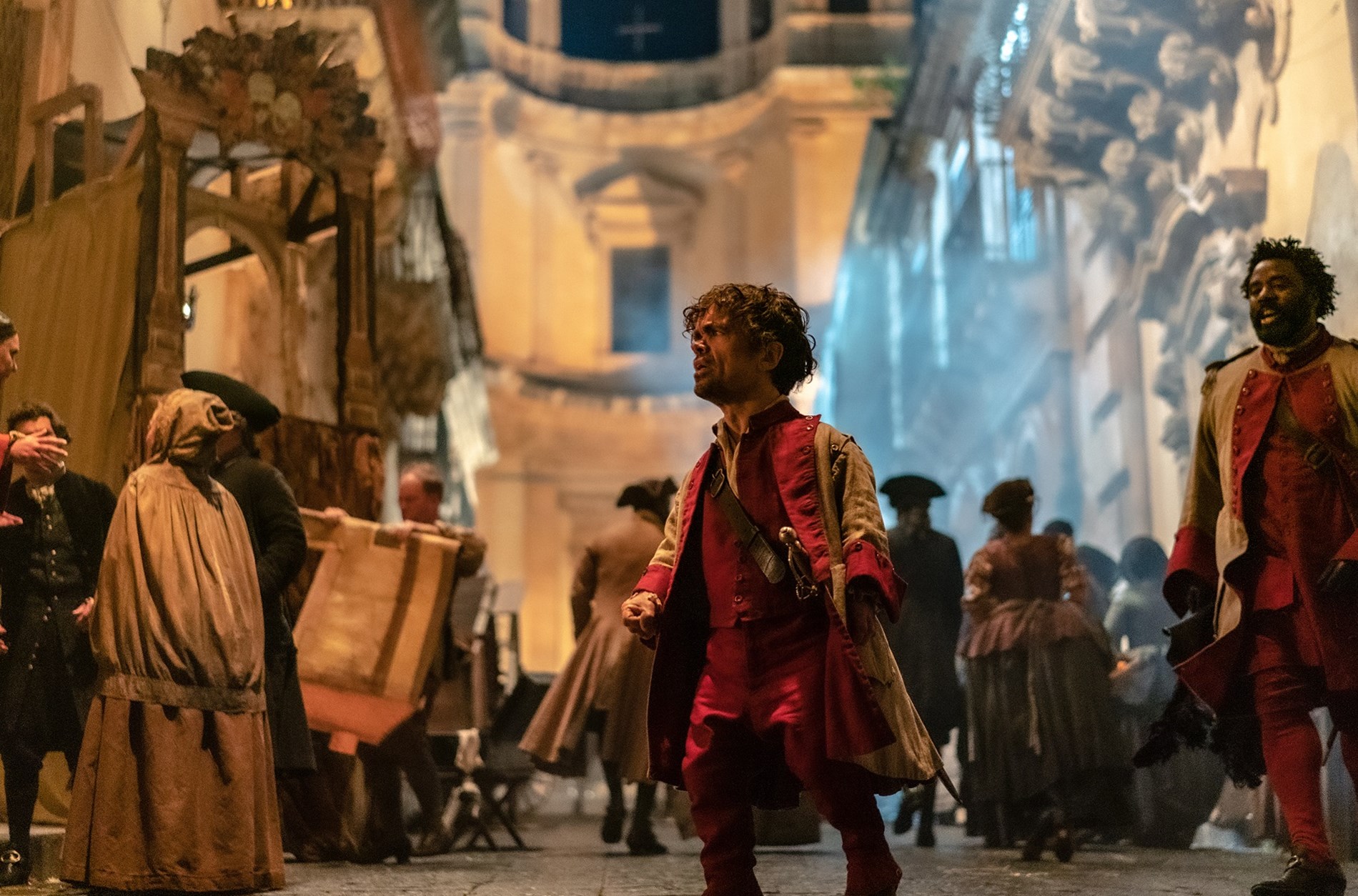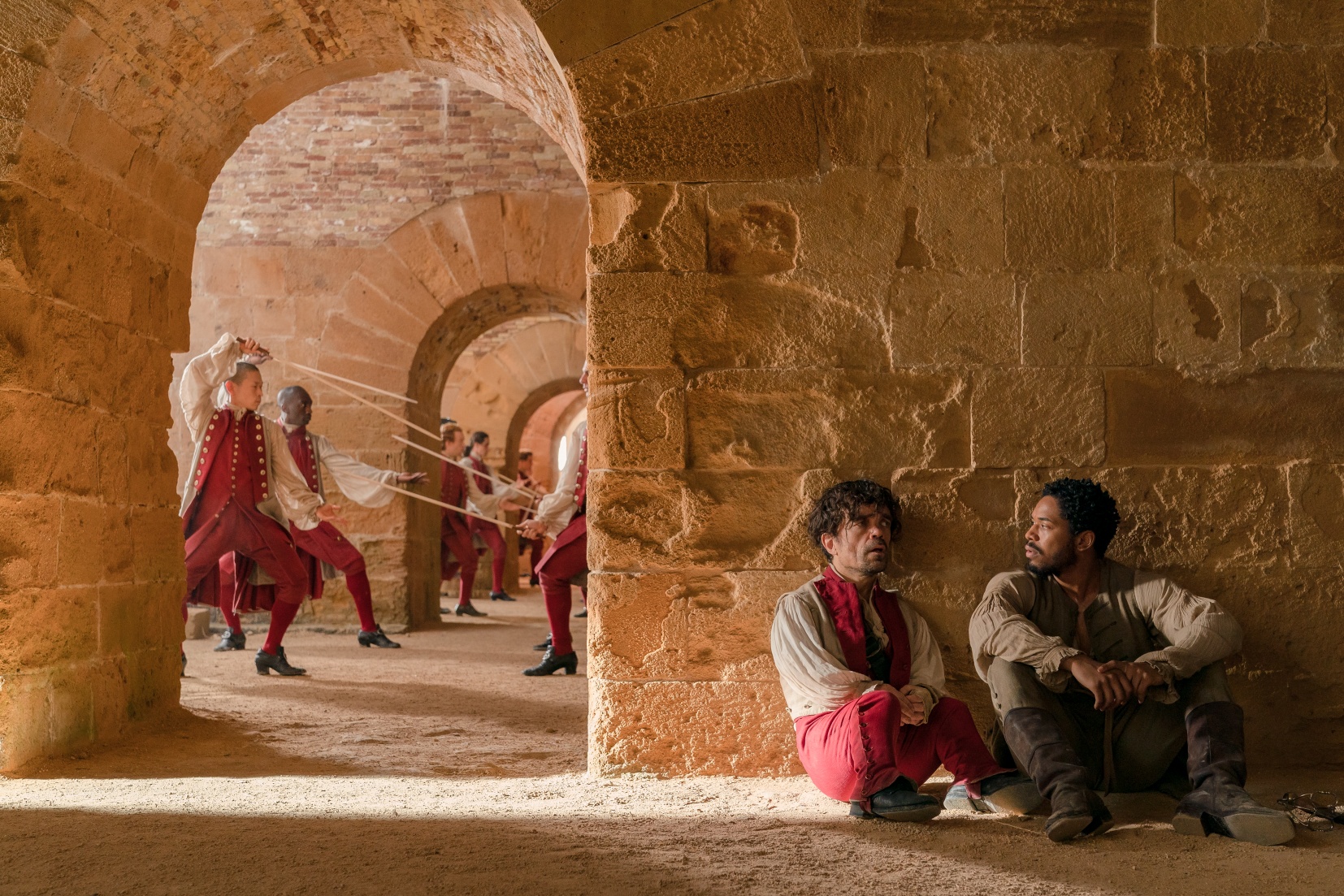Cyrano review - a heady cinematic Valentine | reviews, news & interviews
Cyrano review - a heady cinematic Valentine
Cyrano review - a heady cinematic Valentine
Joe Wright’s impassioned retelling and Peter Dinklage’s ground-breaking star turn distinguish a classic heartbreaker

Edmond Rostand’s familiar story of ventriloquised love becomes a sensual, sacrificial tragedy, in Joe Wright’s heady cinematic Valentine, adapted by screenwriter Erica Schmidt from her own stage musical, with music by members of The National.
The setting is somewhere between the 17th and 18th century, earthy history and fairy tale. We begin in the boudoir of Roxanne (Haley Bennett), as her maid explains the female facts of life: “Children need love, adults need money.” Cash comes from the sinister Duc de Guiche (Ben Mendelsohn), who sweeps her off to the theatre; en route, Wright builds a mistily soft-focus, vividly theatrical, whirling world. Low-angled, sometimes anamorphic cameras peer up at horses’ hooves, Pierrots and puppeteers, reflecting the view of Peter Dinklage’s as yet unseen dwarf Cyrano. Heavily-powdered gentry have ghost-white faces with plague-red spots, sickly next to Bennett’s healthy flush. When soldier-poet Cyrano forcibly takes the stage, and an aristocrat heckles him as a “freak”, this grotesque society makes the insult ironic. Still, what a friend calls his “unique physique” can’t compete with Roxanne’s electric connection to another soldier, gorgeous Christian (Kelvin Harrison Jr., bottom right with Dinklage).
 Wright’s taste for period and literary work, whose big hits have mined Austen (Pride & Prejudice) and Churchill (Darkest Hour), makes him a very mainstream British director, but his reaching here for a richer, deeply felt lushness shows how good that can be. Dinklage’s pained Cyrano, meanwhile, makes a protective shield of his richly baritone wordplay and chivalrous swordplay. Playing a noble-featured, wholly convincing romantic lead, Dinklage makes his physical departure from expectations both unimportant, and transformative. Cyrano will practically change hearts and minds, as well as his already substantial career.
Wright’s taste for period and literary work, whose big hits have mined Austen (Pride & Prejudice) and Churchill (Darkest Hour), makes him a very mainstream British director, but his reaching here for a richer, deeply felt lushness shows how good that can be. Dinklage’s pained Cyrano, meanwhile, makes a protective shield of his richly baritone wordplay and chivalrous swordplay. Playing a noble-featured, wholly convincing romantic lead, Dinklage makes his physical departure from expectations both unimportant, and transformative. Cyrano will practically change hearts and minds, as well as his already substantial career.
When Roxanne, a friend since childhood in some long gone small town, confesses her love of Christian to Cyrano, their exchange has a quick, comfortable rhythm; his stricken face when he realises she doesn’t mean him, and Roxanne’s unspoken realisation of this, gives everything that follows intimate, ambiguous sadness. Whether Cyrano would gain anything by speaking up stays unknown. Instead, he agrees to write love-letters for tongue-tied, besotted Christian: “I will make you eloquent, while you make me handsome.”
This is a truly three-way love story, with Harrison Jr.’s gently likeable Christian more than a handsome lunk. “Love him if not handsome? I cannot imagine it,” Roxanne says of one conundrum at the story’s heart. Her peremptory exploitation of her beauty’s worshippers – her only resource – to send the Duke to war and Cyrano to defend her with his life, like Cyrano’s vain, tortured pride, are only human. Mendelsohn, a specialist in icy, slippery villains, even gives the Duc his say, in the bitterly self-pitying, one could today say Putin-like song “What I Deserve”.
 The famous balcony scene vaults a till now swashbuckling, often screwball film into a new level of innovative intensity, as the hidden Cyrano blurts, “I do not look – speak – as I feel.” His ventriloquism becomes soliloquy when, still hidden, he creeps agonisingly closer to Roxanne and revelation, Christian is struck truly dumb by Cyrano’s feelings, and Roxanne desirously responds, in a heart-breaking power ballad of Shakespearean cross-purposes.
The famous balcony scene vaults a till now swashbuckling, often screwball film into a new level of innovative intensity, as the hidden Cyrano blurts, “I do not look – speak – as I feel.” His ventriloquism becomes soliloquy when, still hidden, he creeps agonisingly closer to Roxanne and revelation, Christian is struck truly dumb by Cyrano’s feelings, and Roxanne desirously responds, in a heart-breaking power ballad of Shakespearean cross-purposes.
Wright keeps to a distinct five-act structure, and the penultimate passage darkens and chills, as the Duc sends Cyrano and Christian’s regiment on a suicide mission. Filmed in the ash and show of Mount Etna in winter, it suggests a distant, wearying Russian conflict. “Wherever I Fall”, sung by three anonymous soldiers to women they’ll never see again, is Band-like Americana, the heartbreaker as protest song this time, poignantly insisting on love before battle’s bitter waste. The tragedy and love only deepen afterwards. Like Spielberg’s West Side Story, another heartfelt, still more masterfully mounted musical of Shakespearean depth, Wright stays true to his source, and the love his film aches to declare.
The future of Arts Journalism
You can stop theartsdesk.com closing!
We urgently need financing to survive. Our fundraising drive has thus far raised £49,000 but we need to reach £100,000 or we will be forced to close. Please contribute here: https://gofund.me/c3f6033d
And if you can forward this information to anyone who might assist, we’d be grateful.

Subscribe to theartsdesk.com
Thank you for continuing to read our work on theartsdesk.com. For unlimited access to every article in its entirety, including our archive of more than 15,000 pieces, we're asking for £5 per month or £40 per year. We feel it's a very good deal, and hope you do too.
To take a subscription now simply click here.
And if you're looking for that extra gift for a friend or family member, why not treat them to a theartsdesk.com gift subscription?
more Film
 Urchin review - superb homeless drama
Frank Dillane gives a star-making turn in Harris Dickinson’s impressive directorial debut
Urchin review - superb homeless drama
Frank Dillane gives a star-making turn in Harris Dickinson’s impressive directorial debut
 Mr Blake at Your Service review - John Malkovich in unlikely role as an English butler
Weird comedy directed by novelist Gilles Legardinier
Mr Blake at Your Service review - John Malkovich in unlikely role as an English butler
Weird comedy directed by novelist Gilles Legardinier
 Don't Let's Go to the Dogs Tonight review - vivid adaptation of a memoir about a Rhodesian childhood
Embeth Davidtz delivers an impressive directing debut and an exceptional child star
Don't Let's Go to the Dogs Tonight review - vivid adaptation of a memoir about a Rhodesian childhood
Embeth Davidtz delivers an impressive directing debut and an exceptional child star
 One Battle After Another review - Paul Thomas Anderson satirises America's culture wars
Leonardo DiCaprio, Teyana Taylor, and Sean Penn star in a rollercoasting political thriller
One Battle After Another review - Paul Thomas Anderson satirises America's culture wars
Leonardo DiCaprio, Teyana Taylor, and Sean Penn star in a rollercoasting political thriller
 Steve review - educator in crisis
Cillian Murphy excels as a troubled headmaster working with delinquent boys
Steve review - educator in crisis
Cillian Murphy excels as a troubled headmaster working with delinquent boys
 Can I get a Witness? review - time to die before you get old
Ann Marie Fleming directs Sandra Oh in dystopian fantasy that fails to ignite
Can I get a Witness? review - time to die before you get old
Ann Marie Fleming directs Sandra Oh in dystopian fantasy that fails to ignite
 Happyend review - the kids are never alright
In this futuristic blackboard jungle everything is a bit too manicured
Happyend review - the kids are never alright
In this futuristic blackboard jungle everything is a bit too manicured
 Robert Redford (1936-2025)
The star was more admired within the screen trade than by the critics
Robert Redford (1936-2025)
The star was more admired within the screen trade than by the critics
 Blu-ray: The Sons of Great Bear
DEFA's first 'Red Western': a revisionist take on colonial expansion
Blu-ray: The Sons of Great Bear
DEFA's first 'Red Western': a revisionist take on colonial expansion
 Spinal Tap II: The End Continues review - comedy rock band fails to revive past glories
Belated satirical sequel runs out of gas
Spinal Tap II: The End Continues review - comedy rock band fails to revive past glories
Belated satirical sequel runs out of gas

Add comment